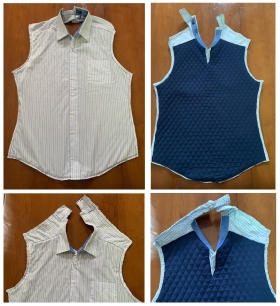LEXINGTON, KY — For residents of VA’s Community Living Centers, dignity is a precious resource. Patients who are there for short rehab stays may be struggling with new, frustrating limitations. Long-term residents might be learning to live with the symptoms of progressive diseases, including dementia, or from the inevitable impact of aging.
Something as simple as mealtime can bring with it a certain amount of awkwardness and humiliation, especially for veterans who have difficulty feeding themselves or need assistance. It’s not uncommon for towels to be placed across a patient’s chest as a makeshift bib to catch any spills.
While it’s effective, the practice is hardly dignified.
Which is why the Dress Up For Dinner project, which provides clothing protectors designed to look like actual clothes, can help a veteran feel more dignified at mealtimes and, in the process, provide a better quality of life.
The idea for the project began at a clinical conference when Jessica Hatterman, CCC-SLP, MS, a speech pathologist at the Lexington VA’s CLC, asked her colleagues if there wasn’t a better solution to mealtime messes than the standard towel.
“It’s not a VA issue,” Hatterman explained. “It’s a hospital issue. It’s done everywhere. We’ve tried to workshop a solution in the past. There are some options they sell online for clothing covers, but they use words we don’t like to use: adult bib. And it’s designed to look like a children’s bib.”
 Hatterman brought the question home with her and went online in search of a solution. There she found a description online of how dress shirts could be cut and stitched and transformed into clothing protectors. An avid crafter and sewer, Hatterman thought she could make it work.
Hatterman brought the question home with her and went online in search of a solution. There she found a description online of how dress shirts could be cut and stitched and transformed into clothing protectors. An avid crafter and sewer, Hatterman thought she could make it work.
Not only would it be functional, but it could provide some additional dignity for the residents and help staff, so they didn’t have to clean clothes all of the time. In addition, the project could involve the CLC’s volunteer community, who had been struggling to find ways to get involved since the pandemic began.
Hatterman tested the clothing protectors with the patients she knew were most open to trying new things. Other veterans saw those veterans using them and asked for protectors of their own, whether they really needed one or not.
“Some of our veterans can’t communicate well how they’re responding to it. But you can tell. They’re eating more. They’re smiling when you put it on them,” Hatterman said. “For some veterans who are fidgeting, they like to have something to touch, and [the protectors] have buttons and pockets. That keeps them physically engaged while someone is assisting with feeding.”
As a student at the University of Kentucky, where she received her undergrad and master’s degrees, Hatterman was always interested in providing speech therapy to adult and geriatric populations.
“The job is all about dignity and respect and function, and we sometimes forget that adults need that as much as children,” she declared. “You see a grumpy old man who doesn’t want to do anything. But as a rehab therapist, you say, ‘No, he just needs to put his hearing aids in so he can hear what you’re saying. And he needs some encouragement to do activities, because he has arthritis. Function that can be restored very easily through education and support.”
One of her clinical rotations was at the Lexington VA, where she was mostly stationed at the CLC. Soon after she graduated, a position opened up, and she took it.
At the CLC, she provides support not just to veterans, but to their physicians, who can have a difficult time communicating with some patients.
“If we have a patient who has a tracheostomy tube, and they need to wear a special valve to be able to talk — I need other providers to know that he won’t be able to communicate with you, if he doesn’t have it on the right way,” she explained. “I’m considered a trained listener for someone who’s using a trach. Because I do it all the time, it’s more intelligible to me.”
Because her specialty is in dementia care, she also has more experience understanding the needs of those particular patients.
“I’ll notice that someone is having trouble initiating tasks, so I’ll know that hand-over-hand care is important,” Hatterman said.
It’s that fine attention to detail—seeing exactly what a veteran needs in order to get from Point A to Point B—that made Hatterman realize that an alternative to the towel at mealtimes was really needed.
“As a speech therapist, I spend a lot of time with people at meals, and, as someone in rehab, I’m all about making treatment functional,” she explained. “If I see something that isn’t supporting someone’s goals or dignity, I need to change that.”
The project is already spreading beyond Lexington, with staff from other CLCs emailing Hatterman, who is sending out detailed tutorials on how to make the dress shirt covers. She’s also applied to the VHA Shark Tank Competition, which identifies and promotes innovative best practices across the department.
For her next adventure, Hatterman is working on a dementia simulation that will help caregivers understand in the broadest sense what someone with dementia has to overcome to complete even basic tasks. Participants will wear shoes that make it uncomfortable to walk; three pairs of gloves with tape around the ends of the fingers; goggles that simulate the specific way that dementia impacts vision; and headphones that pump in constant noise to simulate hearing loss or tinnitus.
“They’ve got all this gear on; then you put them in a room and tell them to go open a window or move the table. First they need to hear you, to understand you, then go and do all of those things,” Hatterman explained. “We show [staff] how dementia can affect your functioning and use that to educate them on what’s beneficial when they’re caring for these patients.”

